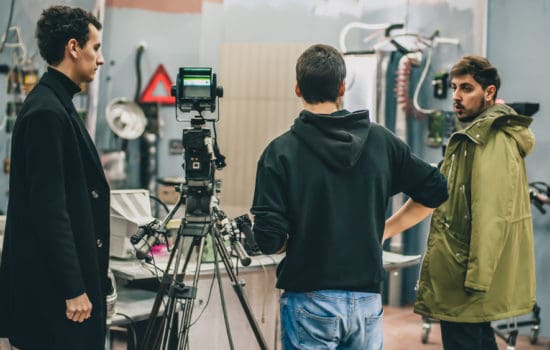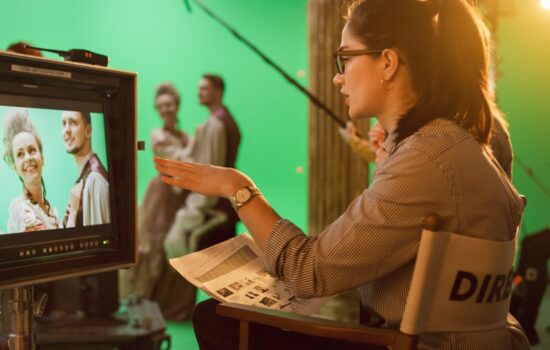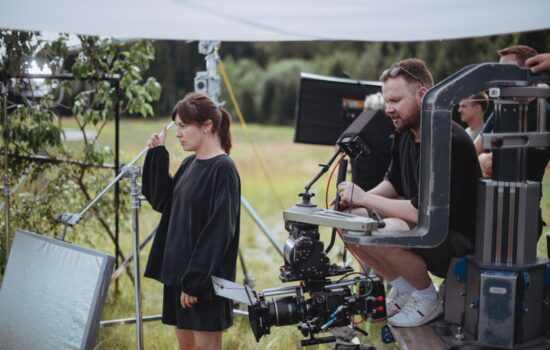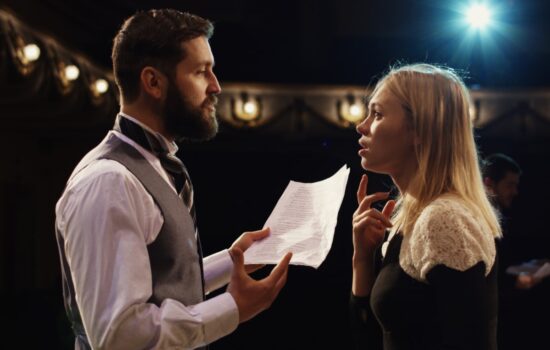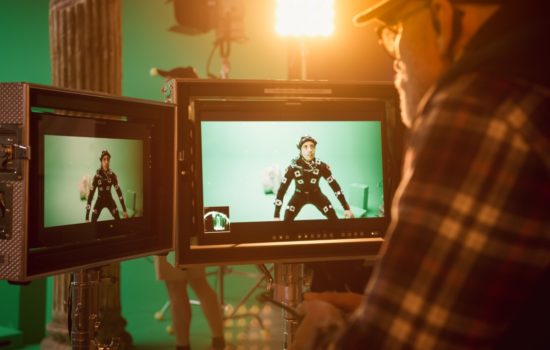Composer

How To Become a Composer
People also ask
Career Description
The Composer provides the score for a motion picture. Robert Allaire, who has scored multiple features in various genres, says, “Every day can be different depending on what stage of a project I’m on.”
“Most of my day is broken up into large chunks of time for writing cues. In the morning I will usually tackle any revisions that have been requested on cues I submitted the day before and the second half of the day is spent writing new music.”
“If a new cut of a project comes in I’ll take some time to review any changes so I can make a note of cues that need to be conformed to the new timing. If we’re near the end of a project and the music is already written I might be in recording sessions or mix sessions.”
It is incredible how music can affect the overall feeling of a scene. It can change the mood, highlight important information and smooth transitions between moments. Composers work in the post-production process but sometimes they will provide temp cues for the Director, even before principal photography. Usually, the score of a film is unique to each project, however, if it becomes popular, the music can be licensed out for other jobs like commercials.
What does a Composer for film do?
A Film Composer creates the instrumental score that accompanies the various scenes in a movie. They often produce individual themes for different characters or relationships in the film and elevate the emotional poignancy of the story being told.
Salary
The average annual salary for a Composer is approximately $49,300. The annual salary range for Composers runs from $42,000 to $59,000.
Composers set their own rates, with those just getting started often earning very little (sometimes nothing) when compared to instantly recognizable names with lengthy careers. Their rate may change based on the type of production, time required, and production budget.
How much do Film Composers make?
According to ZipRecruiter, the average annual salary for a Film Composer is $58,869. Of course, famous Composers such as John Williams or Hans Zimmer are outliers who have accrued many millions of dollars over the course of their careers. But for most Film Composers, the average salary tends to come in between $20,000 and $119,000 per year.
Hey, what do you think about trying our new Film Career HelperFilm Career Helper really quick? It’s totally free and could help get your career moving fast! Give it a try. It’s totally free and you have nothing to lose.
Career Outlook
The Composer is a freelance position so it’s up to the individual whether to take a job. That said, Allaire reminds us that “film composing is a demanding job and it’s not unusual for me to work sixteen-hour days, seven days a week. Weekends don’t really exist so it’s important to carve out personal time anywhere possible. Most often I’m interfacing with the Director, going back and forth on cues until everyone is satisfied with the result.”
Most of a Composer’s work occurs unsupervised. There’s no real off switch, only deadlines that must be met. As a result, the job can be draining so Composers will try to take a few weeks off between projects (but they don’t always get that luxury). Projects sometimes overlap so it becomes a game of trying to finish one so that the deadline for another doesn’t get too close. Time management and self-motivation is an important nuance of being a Composer.
The Composer works with the film’s Director and Producers to determine what music will go into the project. They also frequently work with the Film Editor for getting the music into the film. The people on staff in the scoring department are Musicians, Mixers, and Orchestrators. The Composer will be at the final sound mix of a film or send a representative in their place to make sure everything is translating correctly.
Can anyone become a Film Composer?
In theory, yes. However, it does take a combination of various skills and opportunities to find success in this field. For one, an understanding of musical composition. Two, the ability to collaborate with others and take direction. And three, the resourcefulness required of all industry professions in terms of continually networking and hustling for work.
Career Path
Allaire says, “Many Composers start out working as an Assistant to a more established Composer, although that’s certainly not a requirement. After a while, they might be asked to do some orchestrating or to compose some additional music for a project. Another way to get started and get experience is to find student films or other small projects.”
Like many other freelance jobs in filmmaking, the way a Composer grows their career is through referrals and noteworthy projects. When a film plays a festival it’s the Composer’s chance to network with Producers and Directors who can hire them in the future. Whether beginning as an Assistant or taking on small projects, it’s important for a Composer to make their own work and get it into films because that is what will launch a career.
“There’s isn’t really one tried-and-true path for aspiring Composers. Every working Composer will have a different story of how they got to the position they’re in. Find Composers you like and apply for Assistant jobs. Go to film schools and offer your services on student films. Try everything,” says Allaire.
Remember, composing is a freelance position that nobody gets promoted to do. Every Composer is contracted by Producers and Directors to collaborate on a project. The more well-known a Composer is, the better job security they’ll have, and the more money they can make.
- Study a lot of music: not just film music.
- Develop a unique artistic voice. Think about what it should say with music and how to say it.
- Get practice by working on small projects.
- Research different Composers and look for opportunities to apprentice with them.
Who is the most popular Film Composer?
The most popular Film Composer is a highly subjective topic that often is based on individual musical sensibilities. However, among the many well-known Film Composers over the history of cinema, the two that many people first think of for both their music and box office success are John Williams and Hans Zimmer.
Experience & Skills
“Film music is very technology-dependent so having experience with computers and technology is pretty crucial, in addition to the musical requirements,” says Allaire.
With the advent of various synthesized sounds, mixing, and digital editing, a Composer must be able to work a program like Pro Tools as well as write music. Many of the jobs a Composer takes, in the beginning, won’t have any live music, due to budget. They’ll be required to build and mix everything off their personal computer.
This also holds true for later in their career where they’ll have to present samples of their ideas to bid on larger jobs. If a Composer also plays instruments and understands how to record, they can play for themselves. However, all of this requires a technological understanding.
Other special skills that come in handy are budgeting, hiring musicians, and orchestration. If a Composer can handle their own budget, work deals, and hire their musicians then they’ll be able to make more money and produce higher quality work. By wearing multiple hats, the Composer can have more agency in their work which will allow them to create better projects, gaining more recognition.
Since the art form is so contingent on budget to make different artistic decisions, the faster a Composer can work with larger budgets, the quicker a snowball effect will begin. Much of the prior experience needed to book big jobs is proof that a Composer has worked on a large budget level and can effectively produce what is needed for the project.
Allaire says, “You need to be hard-working and willing to chase after your goals. Nothing in the film industry will wait for you. Being personable is helpful because opportunities in this industry are all about networking. Then when the opportunity comes you need to have already put the time and focus into honing your craft and having something really special to offer the person who may want to hire you.”
Many people forget how much the career of a Composer is based off referrals and people wanting to spend time with another individual. Collaboration on the score of a film can take months to create with multiple cues. Even if someone is insanely talented they can lose a job to another Composer just because it’ll be an easier working experience.
Also, the best opportunities suddenly appear out of nowhere. There is little time to prepare so it’s necessary to be constantly writing and developing the craft so when the big break comes, the aspiring Composer is ready for it.
What is it like to be a Film Composer?
The professional life of a Film Composer can be a highly rewarding one, as many musical scores have become synonymous with the films for which they were created. As with virtually every other specialty in film, a Film Composer career can be one of fits and starts. A Composer may have one gig in a given year or several, which can impact their annual salaries and result in a schedule that greatly changes from week to week and month to month. Film Composers must also be adept at collaboration with Directors, as they generally will take instruction from them regarding the emotional tone desired for a film.
Education & Training
The Composer is a musician. Allaire says, “A rich background in music is key. For some that might mean formal training at a university or conservatory while others with a different background might be inclined to dive right in. The most important thing is to be immersed in making music of all kinds.”
However, they are also storytellers. If a Composer can understand the plot, motifs, character motivations, transitions, and general story arcs then they’ll be more effective in different sections of the story, creating the correct nuances. If they take the time to do some short film school courses or read books on screenwriting it will help them collaborate better.
While the Composer is a musician, they are also a storyteller so taking the time to become a hybrid will help their career progress.
Do Film Composers need a degree?
Strictly speaking, a Film Composer is not required to have a degree to work in film. However, Composers must have extensive knowledge of musical composition and its relationship to film to be successful at their careers. In many cases, this means going to school to learn specifically how to create instrumental compositions, as well as how to create scores specifically for the screen.
Additional Resources
Allaire says, “The Society of Composers and Lyricists is a great resource and performing rights organizations like ASCAP or BMI provide lots of support and events for musicians.” Many film scores can be found on Spotify as well.
Regarding networking events, Composers should check out local non-profit film organizations like Film Independent, The Independent Filmmaker’s Project and film festivals. They not only have networking events but also classes geared directly toward Composers for improving their craft.
FAQ
What is the single biggest suggestion you would give to someone wanting to get into this career?
“Be unique. There are so many aspiring Film Composers out there and many of them sound the same. The way to vastly improve your chances of being heard is to have a unique voice that stands out from the crowd.
“This, more than anything else, is what holds aspiring Composers back. They hear people they admire and then emulate them. What’s worse is that often Directors will hear music they like and box the Composer into those artistic decisions.
“What a Composer chooses to work on and who they decide to work with will directly affect the unique voice they’re creating. This will also determine the future projects they work on, which can become a never-ending circle. Therefore, maintaining artistic integrity and creating something special is the way to get ahead and do the work that interests the Composer.”
What’s the #1 mistake people make when trying to get into this career?
“A lot of young Composers send out demos that aren’t well-produced. Music should sound as good as possible, especially with the technology available today.
“Unfortunately, the people listening to the music usually don’t have a deep understanding of the craft and won’t be able to separate talent from a bad mix. This obviously hurts a Composer’s chances of being selected if they have a bad demo, even though they may be the most qualified person for the job.
“As a side note, it’s also important to remind Producers and Directors to listen to the music with headphones since laptop speakers and phones will vastly change the quality of sound heard. All Composers must use the advances in technology today to make their music sound the best it can (as obvious as that is) because the people listening don’t usually have the knowledge to discern a good theme from a bad mix.”
What is the question people should ask about this career but rarely do?
“How is a Film Composer also a filmmaker?
“People often don’t consider that a film Composer is not just a musician but also a filmmaker. A film Composer takes what’s on the screen and enhances it. Having a deep understanding of film and how a scene plays is key. A single line of dialogue or a subtle look from an Actor might shift a scene in an instant.
“The film Composer needs to be sensitive to those subtleties. They may be tasked with accentuating that moment or changing its meaning. For a generic example, if a man looks back at a woman after she walks away, it will have one feeling with a sinister score versus a romantic one. The better the Composer can interpret the film and build in nuances, not only will the better their score be but the film overall, as well.”
What is one thing I should have asked which I didn’t?
“When should a Composer be brought into the filmmaking process?
“The earlier a Composer is hired the more creative they will be able to be. Usually, they come in during post-production when a film is edited. The worst is when it happens after picture lock. When music is added to a film it changes the rhythm of the movie. Even if there was temporary music, when the final score comes in slight adjustments will most likely need to be made to get the best score possible.
“If the Composer is boxed in, they’ll have to make compromises that don’t make any sense for the overall picture, compromising the integrity of the project.”
If you could describe in one word what makes you successful, what would it be?
“Self-critical. Once I feel like I’ve reached the level I want, I’ll let you know.”
Sources

Robert Allaire
Robert Allaire is a Los Angeles-based Composer whose work at the intersection of music and sound design has been heard in films, video games, and over 750 television episodes.
His diverse range has led to a wide variety in his film work. He provided an intimate, romantic orchestral score for Dennis Hauck’s bold debut feature Too Late, a metal-infused noise score for Adam Egypt Mortimer’s feminist slasher Some Kind of Hate, and a dark, glitchy electronic score for the Sony video game Kill Strain.
In addition to his own projects, Robert has worked closely with composers such as James S. Levine (American Horror Story) and Garry Schyman (Bioshock) on various television shows and video game projects, providing additional music and synth programming.
Robert is also a lover of experimental film and collaborated with filmmaker Betzy Bromberg on her films And the Night Illuminated the Night and Glide of Transparency. He is a CalArts graduate.
References
- 1Multiple. "Composer Salary in the United States". salary.com. published: Nov 25, 2019. retrieved on: Dec 14, 2019
